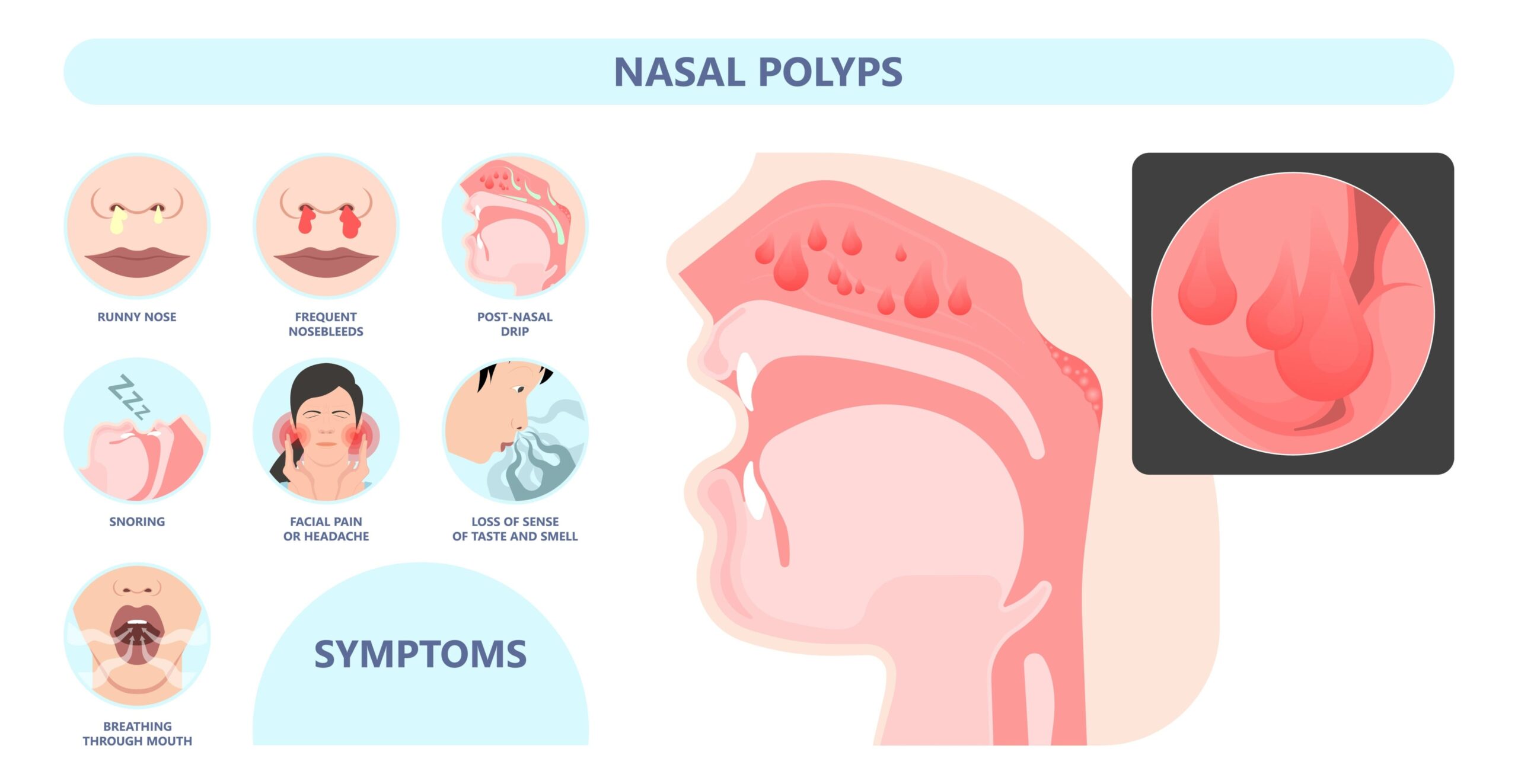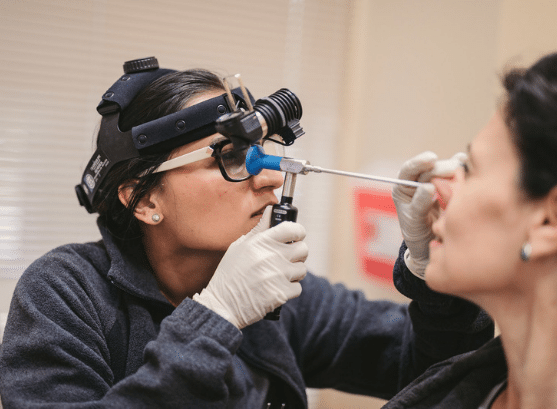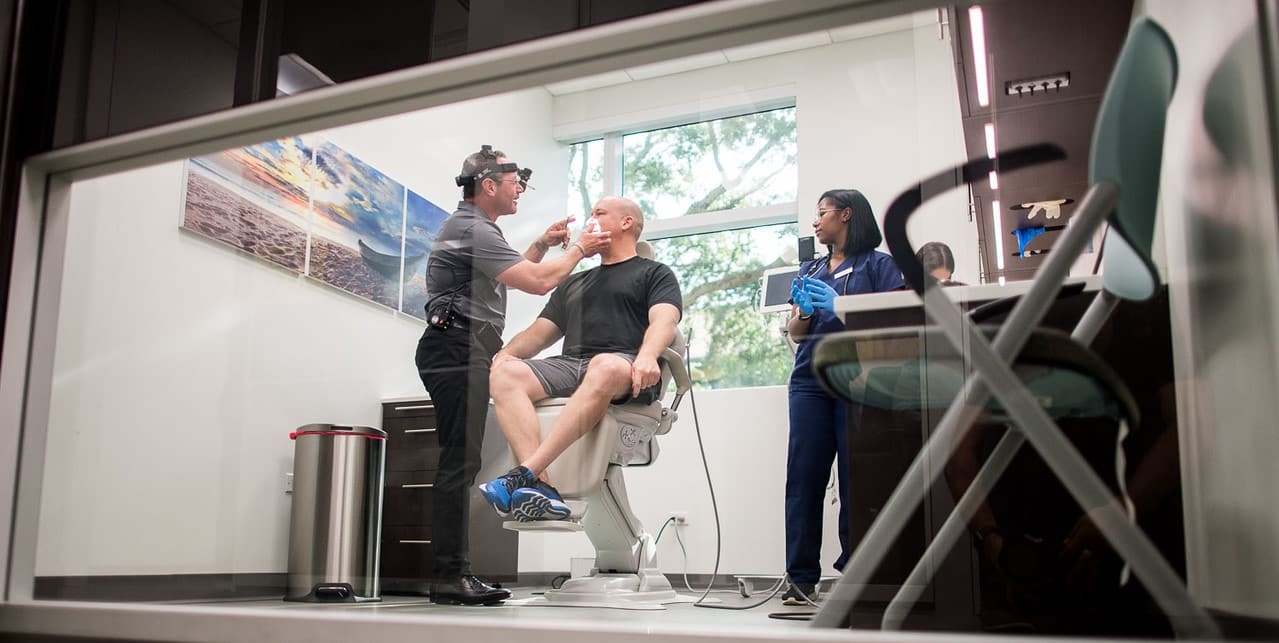Nasal polyps are soft, noncancerous growths that develop on the lining of the nasal passages or sinuses due to chronic inflammation. While they are generally benign, they can lead to significant health issues, including breathing difficulties, reduced sense of smell, and recurrent sinus infections. It may not always be possible to prevent nasal polyps, but you can reduce your risk by receiving timely treatment for allergy symptoms, sinuses, or asthma.
What are Nasal Polyps?
Nasal polyps arise from the mucous membranes in the nasal cavity and sinuses. They can vary in size, shape, and number, with some patients developing a single polyp while others may have multiple growths. Although the exact cause of a nasal polyp is unknown, it’s often associated with conditions that cause chronic inflammation, such as:
- Chronic Sinusitis: Inflammation of the sinuses lasting longer than 12 weeks.
- Asthma: A respiratory condition characterized by difficulty breathing.
- Allergic Rhinitis: Allergies leading to nasal inflammation and congestion.
- Cystic Fibrosis: A genetic disorder affecting the lungs and digestive system.
- Aspirin Sensitivity: Some individuals develop nasal polyps in response to aspirin or non-steroidal anti-inflammatory drugs (NSAIDs).
Symptoms of Nasal Polyps
Common symptoms of nasal polyps include:
- Nasal congestion or obstruction
- Difficulty breathing through the nose
- Reduced sense of smell or taste
- Postnasal drip
- Facial pain or pressure
- Frequent sinus infections
- Snoring
If left untreated, nasal polyps can severely impact a person’s quality of life.
When to Consider Surgery for Nasal Polyps
Surgery for nasal polyps is typically considered when specific conditions are met, particularly when medical management fails or symptoms severely impact a patient’s quality of life. Below is a more detailed examination of these circumstances.
When Non-Invasive Treatment Does Not Work
Most patients begin their treatment journey with conservative management strategies to remove or shrink nasal polyps. These strategies include various medications designed to reduce inflammation and manage symptoms. Here’s a closer look at these treatments:
- Nasal Corticosteroids:
Nasal corticosteroids are usually the first line of treatment for nasal polyps. These medications, such as fluticasone (Flonase) and mometasone (Nasonex), work by reducing inflammation in the nasal passages and sinuses, helping to shrink polyps over time. Patients typically use these nasal steroid sprays daily for optimal effectiveness. The benefits can be substantial, with many patients experiencing a significant reduction in symptoms and polyp size. Based on this, it may take several weeks of consistent use to see improvements, and some patients may not achieve complete relief. - Oral Corticosteroids:
In more severe cases, oral corticosteroids (like prednisone) may be prescribed for a short period. These medications provide a systemic reduction in inflammation and can lead to rapid improvement in symptoms. Furthermore, due to potential side effects associated with long-term use—such as weight gain, elevated blood sugar, and increased risk of infections—doctors generally limit their use to brief courses when necessary. - Antihistamines:
Antihistamines (e.g., cetirizine or loratadine) are used primarily when allergies contribute to nasal inflammation. While they do not directly shrink polyps, they can help alleviate associated symptoms like itching, sneezing, and runny or stuffy nose, making breathing easier for patients. In some cases, allergy shots may be recommended after proper allergy testing for potential Florida allergies that may be aggravating conditions, such as nasal polyps or allergy asthma. - Saline Nasal Irrigation:
Saline nasal irrigation involves using a saline solution to flush out mucus, allergens, and irritants from the nasal passages. This can help reduce nasal congestion and improve overall nasal hygiene. Many patients find that incorporating nasal irrigation into their daily routine enhances the effectiveness of other treatments, but it may not be sufficient on its own to relieve symptoms if polyps are present.
If a patient continues to experience symptoms such as nasal obstruction, chronic congestion, itchy eyes, or diminished sense of smell despite undergoing these medical therapies for a significant period, surgery may be warranted to remove the polyps and restore nasal function.
When Symptoms Affect the Quality of Life
Patients suffering from nasal polyps may experience a range of debilitating symptoms that significantly affect their quality of life. These symptoms can include:
- Chronic Congestion:
Persistent nasal congestion can lead to difficulty breathing through the nose, which can disrupt sleep and lead to fatigue during the day. If you ignore or fail to manage allergies, the condition may eventually affect the immune system. - Facial Pressure and Pain:
The presence of polyps can cause a sensation of fullness or pressure in the face, particularly around the sinuses, leading to discomfort or pain. This discomfort can be exacerbated by changes in weather or physical activity. - Loss of Smell (Hyposmia or Anosmia):
Many individuals with nasal polyps report a reduced ability to smell or taste, impacting their enjoyment of food and overall quality of life. This loss can lead to nutritional deficiencies if individuals avoid eating due to diminished taste.
When these symptoms become severe and persistent, affecting daily activities, social interactions, or overall well-being, patients may choose to pursue surgical options to alleviate their discomfort. Surgery can provide a more immediate and effective solution compared to ongoing medical therapy.
When Recurrent Sinus Infections Occur
Individuals who experience recurrent sinus infections, or sinusitis, often face a cycle of illness that may not respond to antibiotics or other treatments. This situation can arise for several reasons:
- Chronic Inflammation:
The presence of nasal polyps can lead to chronic inflammation of the sinuses, making them more susceptible to infection. - Obstructed Sinus Drainage:
Polyps can obstruct the natural drainage pathways of the sinuses, preventing mucus from exiting properly. This stagnation can create an environment conducive to bacterial growth, resulting in recurrent sinus infections.
When sinus infections become frequent and disruptive—resulting in symptoms like facial pain, fever, and green or yellow nasal discharge—surgery to remove polyps may improve sinus drainage and reduce the frequency of infections. Many patients experience significant relief from symptoms and a reduction in the number of sinus infections following surgery.
When Other Complications Occur
In some cases, nasal polyps may lead to complications that necessitate surgical intervention. These complications can include:
- Sleep Apnea:
Nasal polyps can contribute to obstructive sleep apnea by blocking the upper airway during sleep. This condition can lead to disrupted sleep patterns, daytime fatigue, and increased risk of cardiovascular problems. - Persistent Headaches:
The pressure exerted by nasal polyps can lead to chronic headaches or migraines, significantly impacting a patient’s ability to function. If medical treatments do not alleviate headache symptoms, surgery may provide relief. - Vision Problems:
In rare cases, large polyps can exert pressure on nearby structures, potentially affecting vision. If polyps cause vision disturbances, surgical intervention becomes critical to prevent further complications.
If patients experience any of these complications, surgical evaluation is warranted to assess the necessity of polyp removal and improve overall health and quality of life.
Nasal Polypectomy: Dr. Mandel’s Minimally Invasive Surgery to Remove Nasal Polyps
When conservative treatments, such as medications, do not provide relief, Nasal Polypectomy emerges as a highly effective solution to remove nasal polyps. This minimally invasive surgical procedure is performed by Dr. Mandel at Florida Sinus and Snoring Specialists, offering patients significant benefits, including quick recovery times, low risk, and minimal discomfort.
Steps Involved in the Surgical Procedure
1. Preoperative Preparation: Before the procedure, patients will undergo a thorough evaluation, including a physical examination and imaging studies, such as a CT scan, to assess the size and location of the polyps. Dr. Mandel will discuss the procedure, potential risks, and expected outcomes to ensure patients are well-informed.
2. Anesthesia: Nasal polypectomy is typically performed under local anesthesia, although general anesthesia may be used in certain cases. Local anesthesia numbs the nasal passages, allowing patients to remain awake and comfortable throughout the procedure without pain or discomfort.
3. Endoscopic Visualization: The procedure begins with the insertion of an endoscope, a thin, flexible tube equipped with a camera and light, into the nasal passages. This provides a clear view of the nasal cavity, allowing Dr. Mandel to locate the polyps accurately.
4. Polyp Removal: Once the polyps are identified, Dr. Mandel employs specialized surgical instruments to carefully excise the polyps from the nasal lining. The use of endoscopic techniques ensures precision, as the surgeon can visualize the polyps on a monitor, minimizing damage to surrounding tissues.
- Techniques Used:
- Suction Coagulation: A method that uses suction to remove polyps while simultaneously cauterizing the area to minimize bleeding.
- Scissors or Forceps: For larger polyps, traditional surgical instruments may be utilized to cut and remove the growths effectively.
5. Ensuring Drainage: After the polyps are removed, Dr. Mandel may irrigate the nasal passages with saline to clear mucus and debris, promoting proper drainage and reducing the likelihood of postoperative complications.
6. Conclusion of the Procedure: The entire nasal polypectomy typically takes about 30 minutes or less. After the surgery, patients are monitored briefly to ensure they are stable before being discharged.
Benefits of Nasal Polypectomy
Nasal polypectomy offers several advantages, making it an appealing treatment option for patients suffering from nasal polyps:
Minimally Invasive
- No Incisions Required:
One of the significant benefits of nasal polypectomy is that it doesn’t involve any incisions, making it a truly minimally invasive procedure. This reduces trauma to the body and enhances recovery.
Outpatient Procedure
- Same-Day Discharge:
Patients can return home on the same day as the procedure, eliminating the need for an overnight hospital stay. This is particularly beneficial for those with busy schedules or family obligations.
Quick Recovery Time
- Rapid Return to Normal Activities:
Most patients experience minimal discomfort and can resume their daily routines within a few days. Some may even return to work the next day, depending on their overall health and the complexity of the procedure.
Minimal Discomfort
- Manageable Pain Levels:
Patients typically report only mild discomfort after the procedure, which can be managed effectively with over-the-counter pain relievers. The use of local anesthesia also contributes to reduced postoperative pain.
Improved Quality of Life
- Symptom Relief:
By removing the polyps, patients often experience significant relief from nasal congestion, improved breathing, and a reduction in sinus infections. Many also notice an enhancement in their sense of smell and taste.
Reduced Need for Medications
- Long-Term Management:
Following a nasal polypectomy, patients may find they require fewer medications, such as nasal corticosteroids, to manage their symptoms. This can lead to fewer side effects associated with long-term medication use.
Frequently Asked Questions on Nasal Polypectomy
What symptoms might indicate the need for a nasal polypectomy?
Symptoms that may suggest the need for a nasal polypectomy include:
- Persistent nasal congestion or blockage
- Difficulty breathing through the nose
- Reduced or lost sense of smell or taste
- Frequent sinus infections
- Facial pressure or pain
- Snoring or sleep disturbances
Are there any risks or complications associated with nasal polypectomy?
While nasal polypectomy is generally safe, like any surgical procedure, it carries some risks, including:
- Bleeding from the nasal passages
- Infection at the surgical site
- Changes in sense of smell
- Recurrence of polyps
- Damage to surrounding tissues or structures
How should I prepare for the procedure?
Preparation for a nasal polypectomy may include:
- Avoiding blood thinners (such as aspirin or ibuprofen) for a few days prior to the surgery, as advised by your doctor.
- Discussing any allergies or medications with your healthcare provider.
- Arranging for a ride home after the procedure if anesthesia is used.
- Following any specific instructions given by your surgeon regarding eating or drinking before the procedure.
What is the recovery process like after a nasal polypectomy?
Recovery after a nasal polypectomy is generally straightforward:
- Most patients can return home shortly after the procedure.
- Mild nasal congestion or a runny nose is common in the days following surgery.
- It is advisable to avoid strenuous activities, heavy lifting, and blowing the nose for about a week.
- Follow-up appointments may be scheduled to monitor healing and manage any ongoing symptoms.
Will I need to change my medications after surgery?
Postoperative care may involve changes to your medication regimen. Your doctor may recommend continuing or adjusting nasal corticosteroids to help reduce the likelihood of polyp recurrence and manage inflammation. Always follow your surgeon’s instructions regarding medications after surgery.
How soon can I expect to see improvement after the procedure?
Many patients notice significant relief from nasal congestion and other symptoms shortly after the procedure. However, complete recovery and the full benefits may take several weeks as the nasal passages heal.
How effective is nasal polypectomy in preventing the recurrence of polyps?
Nasal polypectomy can effectively remove existing polyps, but they may recur in some patients, particularly those with underlying conditions like allergies or asthma. Ongoing medical management, including nasal corticosteroids, can help minimize the risk of recurrence.
How long does the nasal polypectomy procedure take?
The nasal polypectomy is typically a quick procedure, often lasting between 20 to 30 minutes. The exact duration may vary depending on the number and size of the polyps being removed and the complexity of the case.
Will I be awake during the procedure?
Most nasal polypectomies are performed under general anesthesia, meaning you will be asleep and unaware during the procedure. In some cases, local anesthesia may be used, allowing you to remain awake but numbing the nasal area to minimize discomfort.
How can I manage any discomfort after the surgery?
After a nasal polypectomy, some mild discomfort or nasal congestion is expected. Over-the-counter pain relievers, such as acetaminophen or ibuprofen, can help manage pain. Additionally, using saline nasal sprays or rinses can aid in keeping the nasal passages moist and reduce discomfort.
What follow-up care should I expect after nasal polypectomy?
Follow-up care is crucial for monitoring healing and managing any potential recurrence of nasal polyps. Your doctor may schedule a follow-up appointment within a week or two after surgery to assess your recovery and discuss any ongoing symptoms. It is also essential to adhere to any prescribed medication regimen and report any unusual symptoms, such as excessive bleeding or severe pain, to your healthcare provider promptly.
Get Lasting Relief from Nasal Polyps with a Minimally Invasive Nasal Polypectomy
If you are struggling with the discomfort of nasal polyps and seeking relief, look no further than Dr. Lee Mandel at Florida Sinus and Snoring Specialists. As a nationally recognized specialist in the field, Dr. Mandel utilizes advanced techniques, such as nasal polypectomy, to help you achieve sustainable relief from nasal polyps and enhance your quality of life. Don’t let nasal polyps or any other Florida allergy or sinuses hold you back from breathing freely and enjoying life to the fullest. Call us today at 954-983-1211 or contact us online to schedule a consultation and take the first step toward improved well-being.




